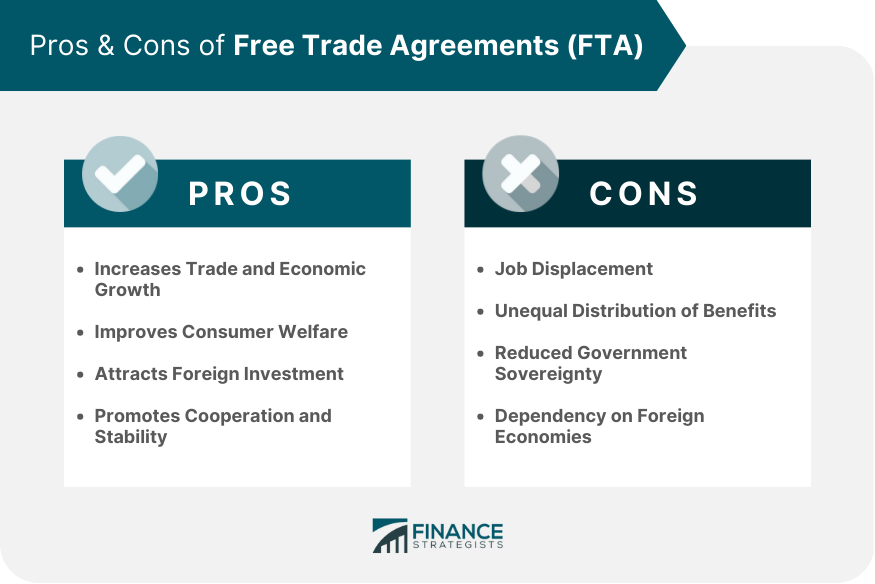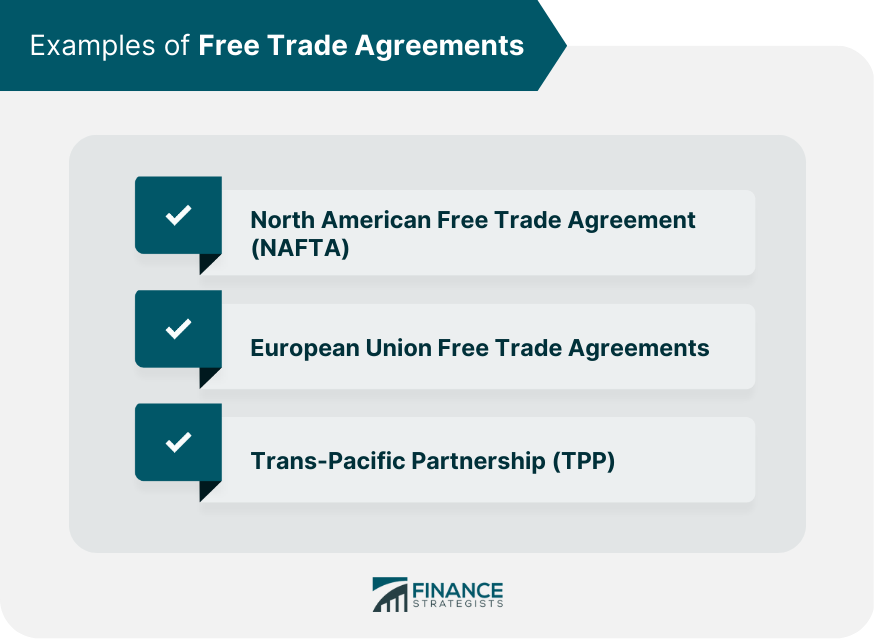A free trade agreement (FTA) is a treaty between two or more countries that reduces or eliminates trade barriers such as tariffs, quotas, and other non-tariff barriers to trade. FTAs aim to increase economic growth and job creation by promoting international trade. FTAs go beyond just the elimination of trade barriers. They also address several other issues, such as intellectual property rights, labor and environmental standards, and dispute resolution mechanisms. By eliminating trade barriers and providing a framework for trade, FTAs facilitate the movement of goods and services between countries, leading to increased efficiency and economic growth. FTAs also create a stable and predictable business environment. Investors are more likely to invest in countries that have signed FTAs because they provide a level of certainty and protection for their investments. FTAs also create opportunities for businesses to expand and access new markets. Free trade agreements are important for several reasons. First, they promote economic growth by reducing trade barriers and increasing trade between countries. This can lead to increased efficiency, innovation, and job creation. Second, FTAs can lead to lower prices for consumers due to increased competition and access to a broader range of goods and services. Third, FTAs can attract foreign investment and create a more favorable business environment for foreign investors. Fourth, FTAs can promote cooperation between countries, leading to more stable relationships and reducing the likelihood of conflicts. The idea of free trade has been in existence for centuries, with the first free trade agreement signed in 1860 between France and the United Kingdom. In the 20th century, the number of FTAs increased, with the United States leading the way by signing several bilateral agreements with other countries. In the 1980s and 1990s, many countries began negotiating regional and multilateral free trade agreements. Below are the advantages of free trade agreements: Increases Trade and Economic Growth: FTAs promote economic growth by reducing trade barriers and increasing trade between countries. Countries can specialize in their comparative advantages, leading to increased efficiency, innovation, and job creation. Improves Consumer Welfare: This agreement can result in lower prices for consumers due to increased competition and access to a broader range of goods and services. Attracts Foreign Investment: They can create a more favorable business environment for foreign investors, leading to increased investment flows. Promotes Cooperation and Stability: Free trade agreements can promote cooperation between countries, leading to more stable relationships and reducing the likelihood of conflicts. Below are the disadvantages of free trade agreements: Job Displacement: FTAs can lead to job losses in certain sectors, particularly in industries that are not competitive in the global market. Unequal Distribution of Benefits: They can lead to an unequal distribution of benefits, with some sectors and groups benefiting more than others. Reduced Government Sovereignty: Free trade agreements can limit a government's ability to regulate trade in the interest of public health, the environment, or national security. Dependency on Foreign Economies: FTAs can increase a country's dependence on foreign economies and expose them to external shocks. The following are some examples of free trade agreements: Signed in 1994, NAFTA is a trilateral agreement between the United States, Canada, and Mexico, creating a free trade area between the three countries. NAFTA eliminated tariffs on many goods and services, leading to increased trade and economic growth. The European Union (EU) has signed several free trade agreements with other countries, including South Korea, Singapore, and Canada. The agreements eliminate tariffs on many goods and services and aim to increase trade and investment flows between the EU and partner countries. The TPP was a free trade agreement signed in 2016 by 12 Pacific Rim countries, including the United States, Japan, and Australia. The agreement aimed to reduce trade barriers and promote economic growth in the Asia-Pacific region. The future of FTAs is subject to numerous factors, including changes in global trade patterns, the rise of protectionism, and the emergence of new economic powers. The COVID-19 pandemic has also disrupted global trade and exposed the vulnerabilities of the global supply chain. The trend toward regional and multilateral FTAs is likely to continue, with more countries seeking to reduce trade barriers and increase economic growth. However, the rise of protectionism in some countries may hinder progress toward new agreements. The emergence of new economic powers, such as China, may also impact the future of FTAs. China has already signed several regional and bilateral free trade agreements. They are likely to continue pursuing their trade agenda, potentially challenging the United States and other Western countries' dominance in global trade. In conclusion, FTAs have become an important aspect of international trade, with the goal of promoting economic growth, job creation, and mutual benefits for all. While FTAs have several advantages, they also have potential disadvantages, including job displacement and reduced government sovereignty. The negotiation and implementation of FTAs are complex processes that involve several stages, including negotiations, signing, and ratification by the countries involved. The future of FTAs is subject to numerous factors, including changes in global trade patterns and the rise of protectionism. FTAs need to address emerging issues and challenges, including environmental and labor standards, digital trade, and intellectual property rights, while also promoting innovation and economic growth. For more information on Free Trade Agreements, you can consult with a financial professional who specializes in wealth management or macroeconomics.What Is Free Trade Agreement (FTA)?
Importance of Free Trade Agreements
History of Free Trade Agreements
Advantages of Free Trade Agreements
Disadvantages of Free Trade Agreements

Examples of Free Trade Agreements
North American Free Trade Agreement (NAFTA)
European Union Free Trade Agreements
Trans-Pacific Partnership (TPP)

Future of Free Trade Agreements
Final Thoughts
Free Trade Agreement (FTA) FAQs
A free trade agreement (FTA) is a treaty between two or more countries that reduces or eliminates trade barriers such as tariffs, quotas, and other non-tariff barriers to trade.
FTAs promote economic growth by reducing trade barriers and increasing trade between countries. They can lead to lower prices for consumers, attract foreign investment, and promote cooperation between countries, leading to more stable relationships.
FTAs can lead to job losses in certain sectors, an unequal distribution of benefits, limited government ability to regulate trade, and increased dependence on foreign economies.
Some examples of FTAs include the North American Free Trade Agreement (NAFTA), European Union Free Trade Agreements, Trans-Pacific Partnership (TPP), and other regional and bilateral FTAs.
The future of FTAs is subject to numerous factors, including changes in global trade patterns, the rise of protectionism, and the emergence of new economic powers such as China. However, the trend towards regional and multilateral FTAs is likely to continue, with more countries seeking to reduce trade barriers and increase economic growth.
True Tamplin is a published author, public speaker, CEO of UpDigital, and founder of Finance Strategists.
True is a Certified Educator in Personal Finance (CEPF®), author of The Handy Financial Ratios Guide, a member of the Society for Advancing Business Editing and Writing, contributes to his financial education site, Finance Strategists, and has spoken to various financial communities such as the CFA Institute, as well as university students like his Alma mater, Biola University, where he received a bachelor of science in business and data analytics.
To learn more about True, visit his personal website or view his author profiles on Amazon, Nasdaq and Forbes.











